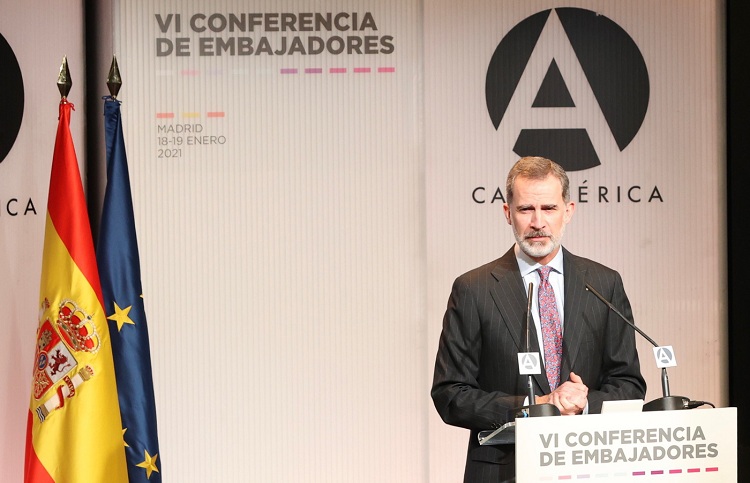The Diplomat
King Philip VI declared yesterday, during his closing speech at the sixth Conference of Ambassadors, that Spain, “because of its history, its diversity, its character and its universal vocation”, must “become a player capable of facilitating dialogue” in these “times of geopolitical and economic change”.
“This year that has ended has not been another one, but rather one that is particularly difficult in many aspects, mainly due to the pandemic that began to spread around the world a year ago”, said the King during his closing speech at the Conference of Spanish Ambassadors accredited to the world, the first held since 2008, which took place this past Monday in Casa de América.
“The pandemic, in its global evolution, has abruptly altered normal life in almost every way, reducing or stopping mobility in its tracks and forcing a drastic adaptation of work in all economic sectors, public services and State action; as is the case with diplomacy, External Action”, he continued.
“The ambassadors of the Kingdom of Spain, together with your teams in our diplomatic delegations around the world, have had to face all of this far from home and, on many occasions, from your families”, the King recalled. “You have always done so with the best disposition and the highest willingness to serve the Spanish people. Today, on behalf of all of them, I thank you and congratulate you. You can feel very proud of the work carried out by the Ministry and the network of Embassies and Consulates“, he added.
According to Philip VI, “the image and external weight of Spain are more decisive than ever”. “Today Spain is a reference in different areas of international life: for its high status as a social and democratic state governed by the rule of law; for the prestige, diversity and universality of its culture; for the eagerness and open and enterprising character of its men and women; for the dynamism and projection of its companies; for its scientific and medical achievements or its sporting successes. But it is also so in areas such as development cooperation and climate change policy, or in our proactive attitude in the search for international peace and the fight for equality”, he continued.
For this reason, he said, “Spain, because of its history, its diversity, its character and its universal vocation, is in a key place and at a key time to become an actor capable of facilitating this dialogue and this joint effort that are so necessary for us”. “We are living in times of geopolitical and economic change that undoubtedly affect the progress of our country” and, for this reason, “our great capacity for dialogue is an asset for our diplomacy, which you, our representatives in this world in the process of accelerated change, already use as a determining tool for work and projection”, the King stated.
The closing ceremony was attended by the Third Vice-President of the Government and Minister of Economic Affairs, Nadia Calviño; and the Minister of Foreign Affairs, Arancha González Laya, as well as the Secretaries of State of the Ministry of Foreign Affairs and, in person, some of Spain’s ambassadors accredited abroad. The rest, until a total of around 130 heads of mission have completed the mission, did so by telematic means from their countries of destination.
Pablo Iglesias: “Spain must be an international reference for the 2030 Agenda”
During the second day of the Conference, and before the closing ceremony, the following spoke, among others: Nadia Calviño, who stated that 2021 will be a year of transformation and modernization thanks to the Recovery, Transformation and Resilience Plan; the Minister of the Interior, Fernando Grande-Marlaska, who explained the migration policy; Arancha González Laya, who gave an assessment of the event; and the member of the Government probably most expected by all, the second vice-president and Minister of Social Rights and 2030 Agenda, Pablo Iglesias.
During his speech, Iglesias said that Spain “must be an international benchmark in terms of compliance with 2030 Agenda” and therefore announced that the Government will present its Sustainable Development Strategy 2030 – the instrument that will have to establish “the priorities for action and the strategic and transformative policies for building the country we want to have in 2030 in the medium and long term” – to the “National Voluntary Review that our country will undergo during the next United Nations High Level Political Forum to be held in July 2021 in New York”.
According to Iglesias, “the international dimension must be a key element” in moving towards 2030 Agenda. For this reason, he continued, “if Spain wishes to exercise a position of leadership in this area, it is necessary to actively involve all our resources, all the Spanish missions, with special emphasis on our Permanent Representations to International Organisations”. “In all this work, the ambassadors accredited to other countries play a fundamental role”, he said.
“From the Second Vice-presidency we will provide you with all the support that is necessary and I announce that when the situation allows it, both I and the Secretary of State (Ione Belarra), here present, will visit some of the countries and international organisations to which you are accredited with the aim of disseminating Spain’s commitment and willingness to lead in this area, sharing experiences and good practices and supporting your work and your efforts in relation to the objectives”, he said.






